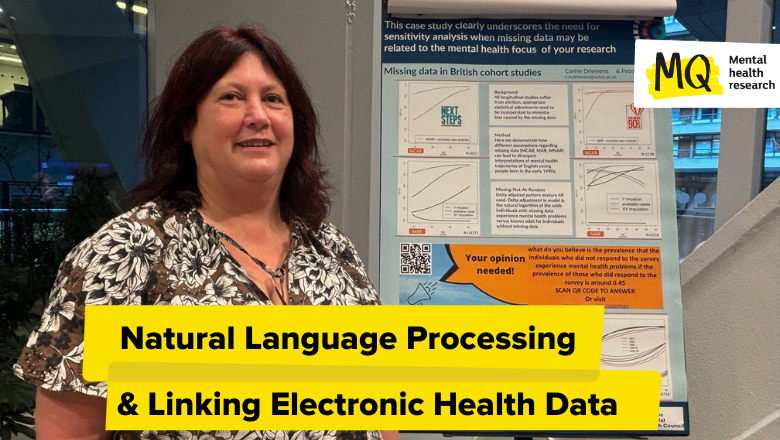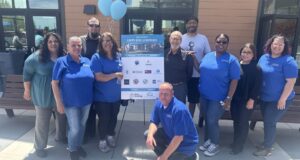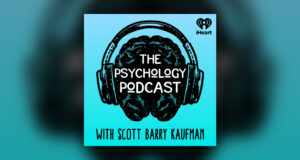
Last week, the MQ and DATAMIND Data Science Meeting & Workshop took place in London.
The DATAMIND Hub expands the benefits of data by safely and securely combining data from multiple sources, such as health records, schools, administration, charities and more. Then, through the UK Health Data Research Innovation Gateway, researchers can discover the data and use it most effectively so that eventually we can together make the next breakthroughs in mental health science leading to a mentally healthier future for us all.
Corine Driessens (pictured above) is a passionate Mental Health Data Scientist who attended the event in London as well as the associated workshop the previous day. Here, she kindly shares what it was like to attend.
Daunted by the topic of this workshop (Natural Language Processing) I made my way to London. Not being a morning person, I had just noticed on my papers that the location was Deutsche Bank, and I thought to myself, ‘I have been there before for previous workshops so I know where to go’. Wake-up call, the bank has moved. I made it to the new location in one piece after some wandering.
Angus quickly made us all feel at ease, no matter your background and your experience with NLP and/or Python. As we moved through the workshop material, I slowly started to understand the breadth of this field of research, and as the day continued, I noticed a few similarities with statistics and qualitative data analysis, methodologies I use in my daily life. I had always been fascinated by NLP, and the potential to get important information from medical written notes, thereby being able to deepen the understanding from EHR analysis. Angus had done a great job preparing a one-day journey through the world of NLP. Even for people like me who had no experience coding in Python or writing models for NLP, the pace was good. A multitude of examples emerged to us in the realities of NLP, always having Leo, Yamiko, or Angus to reach out to if we struggled with running the code or had any general questions.
Understandably the workshop did not make me an NLP researcher in a day, but it provided me with the knowledge base to read publications employing NLP, discuss these methodologies with my ML colleagues within the ARC Wessex, and explore more on my own. Looking forward to the reading list Angus is preparing for us.
The conference, the next day, provided me with ample opportunity to put my new knowledge to the test. Various ECR presentations focused on NLP. I enjoyed the discussion around how the focus of the algorithm (e.g. overlap between types of violence; diagnosis versus symptoms; loneliness/lonely versus alternative descriptions that imply being lonely) can impact the results; was impressed to see that NLP can provide us access to social workers workforce contributions to mental health services.
Rob gave us an excellent overview of the potential of big data, like the Maudsley Trusts CRIS data with its linkages to HES, primary care data, Census, educational data, benefits data, pharmacy, etc, to study digital phenotype of mental health disorders (using NLP). He pressed that although there are currently a lot of opportunities, we should not take them for granted but need to keep moving, incorporating original novel ideas next to evolving existing research pathways.
The rest of the conference allowed us to explore the different aspects of trust. Building patient trust not only enhances data access and improves patient participation in studies, but also enhances (public) confidence in the findings. It was nice to see that my impressions coming from workshops I co-facilitated with individuals living with mental health problems were validated by people with more experience. As Nicola said ‘Keep it real’, be straight with people and honest when you do not know, and make sure that your research fits into the real world. As Vaibhav said mental health research is dependent on human data. In the past few decades, there have been a lot of innovations that allow us to gather and improve data, but we need to build trust with patients to improve participation in studies.
The panel discussion also touched on transparency. What I missed from the discussion was the need to feed back. We do a lot of research with human data, but I personally believe there is a lack of feeding our findings back to our study participants. This post hoc step is usually not included in study protocols, nor can it be included in funding applications.
Sadness overwhelmed me at the end of the conference, remembering Dermot O’Reilly. Nostalgia to the ADRN conference days when he supported me with friendly advice. Remembering that the last time I spoke to him was last year at the MQ/DATAMIND conference. The ECR Memorial Prize is a beautiful way to keep Dermot’s memory and his dedication to ECR support alive.
Overall, I always leave the MQ DATAMIND workshop and conference feeling inspired and full of new ideas and this year was no exception.
A little about me, I am a psychiatric epidemiologist, received my NIMH fellowship-funded PhD training in the USA working with Evelyn Bromet, currently working as a principal research fellow for the ARC Wessex (Home | NIHR ARC Wessex), providing statistical advice to a variety of health-related projects.
I have secured ESRC funding to explore the experiences of young people not receiving mental health services despite experiencing mental health problems. Collaborating with YoungMinds we have co-produced a data analysis plan with young people to analyse cohort data that is linked to EMHR. Collaborating with S3RI I have found a way to deal with the missing data that is prevalent in cohort studies and I presented these findings on a poster at this MQ DATAMIND conference. The major task ahead for me is to clean and format my linked data. I look forward to running the analysis and discussing findings with stakeholders, deeper meaning always comes forth from lived experience I believe.
My first exposure to MQ was at the MQ conference in Manchester in 2017 when my ADRC-E line manager was asked to present. My next experience was the MQ online conference during the COVID pandemic which was very inspiring. Since joining the ARC Wessex in 2021, I have attended most MQ DATAMIND workshops and conferences, slowly getting to know the regulars attending these conferences.
You can read about another early career researcher’s experiences at a Data Science event here.




